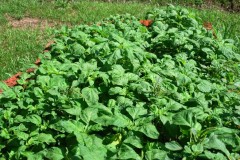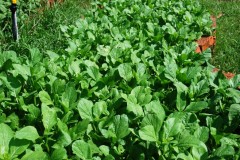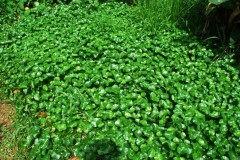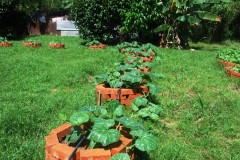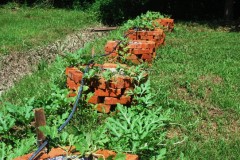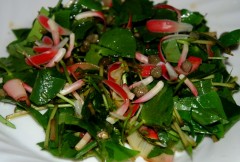Dec 10, 2009
Raised Beds - It is Cost Effective!
Raised beds incorporating design to maximise planting areas and reducing energy input was developed by the Permaculture movement. At DQ, we have added a small innovation, i.e. to make it expandable.
The expandable raised beds are now producing their third harvest:
This is bayam pasir again. We rotated the bed used.
And this is sawi bunga, a brassica chinensis var. It will be ready for harvesting cum thinning in a few days time when the flowers emerge.
There has been no purchased input and minimal on-farm produced inputs. When we replanted, we just top up with some compost, seed the beds and add mulch. We of course rotated beds. Once a week we spray some herbal extracts and our Teh Qi (compost tea) spray. That's about it. No weeding at all was necessary.
If you click on the pictures for a close-up, you can see minimal insect damage. And the plants are sweet and aromatic.
The office staff and their children came to help themselves to the vegetables and herbs, and to have a picnic at the farm.
The next bed that we will expand to, will be used to plant a herb, most probably basil as companion plant. In this way, we will reduce even further insect problems.
Here are some pictures of raised beds elsewhere in the farm:
Lush gotu kola or pegaga raised bed.
Healthy pumpkin plants under the mid-day sun on raised beds.
Watermelon plants on raised beds.
11:11 Posted in Permaculture | Permalink | Comments (0) | Tags: raised beds, key hole garden, permaculture, dark colored plants
Dec 07, 2009
The Internationalisation of Food
The recipes for many of our local vegetables, leaves and herbs can be 'updated' to suit modern taste-buds. This will reduce our dependence on imported fresh food or to pay high prices for transplanting those vegetables and herbs here to grow them.
Due to globalised marketing our perception of what is good and delicious food have changed, and become more 'internationalised'; leading to the possible demise of many local 'heritage' edible plants.
In the sixties and even as late as the seventies, a 'delicious' chicken was aromatic and 'sweet' just from the meat alone (of course you may have to boil the bird for an hour or so!).
Nowadays, a 'delicious' chicken means one that is tender and juicy, and the taste is from the marinate and spices used. Modern marketing have changed our perception and defination of a delicious chicken to accept the bland bird that comes out of factory farms. A bird that has excessive fats (from feeding the birds high grains diet and vegetable oils) is now spun to mean 'tender', and a bird that has both high fats and water content, is now 'juicy', never mind that it is tasteless and a nutritional disaster.
We go into a supermarket and march out with hydrophonically grown vegetables and herbs like arugulas, radicchio, etc. without realising that we have the greatest diversity of edible plants just outside our doors. They present to our senses a wide variety of aromas and tastes, far more than the western vegetables and herbs can ever deliver. And they cost a fraction of the costs of the foreign stuff.
Just go to the pasar tani (farmer's market) and look at the number of 'ulams' (plants that can be eaten raw) to choose from.
And upgrade them to modern taste-buds.
Here's an example from our farm:
Pluck a few young leaves from a lemon tree.
Take some petals from a kantan flower.
And a generous helping of pegaga (gotu kola) with the stalks ( crunchy ).
I like to cut them up to slices. Then add some balsamic vinegar, generous amount of extra virgin olive oil, some himalayan rock salt (less sodium) and pepper. And if you are a bit adventurous, add one passion fruit and some 'dijonaise' (dijon mustard and mayo, half/half) - that's real gourmet stuff we have here, courtesy of yours truly.
There will be an explosion of flavours and fragrances that will rival any on offer in a 5-star hotel.
18:54 Posted in Slow Food / Rare Receipes | Permalink | Comments (0) | Tags: slow food, kantan, pegaga








